|
|
|
Sort Order |
|
|
|
Items / Page
|
|
|
|
|
|
|
| Srl | Item |
| 1 |
ID:
114322


|
|
|
|
|
| Publication |
2012.
|
| Summary/Abstract |
This study discusses four European and American regulatory schemes designed for accounting lifecycle GHG emissions in relation to the Brazilian sugarcane ethanol. The objective is to critically examine the methodologies and associated parameters used in existing regulatory schemes for calculating GHG emissions, and to explore methodological convergences. The issues related to direct lifecycle and indirect land use change emissions have been addressed. It is found that there are commonalities between the European Renewable Energy Directive (EU-RED) and the UK's Renewable Transport Fuels Obligation (UK-RTFO), but the US-EPA's Renewable Fuel Standard (US-EPA) and the Low Carbon Fuel Standard of the California Air Resources Board (CA-CARB) vary greatly not only among themselves, but also in relation to the European regulations. Agricultural practices (especially soil carbon and nitrogen dynamics), co-product credits from surplus electricity and uncertainties around economic modeling approaches for indirect land use change are the major areas where methodological divergences exist. Incorporation of domestic agricultural practices, sugarcane mills operations, and realistic modeling of indirect impacts of land use change using regional models could provide more coherence in estimations of GHG emissions. Furthermore, the Brazilian trend of novelty in all phases of sugarcane bioenergy systems should be considered when projecting GHG emissions.
|
|
|
|
|
|
|
|
|
|
|
|
|
|
|
|
| 2 |
ID:
121286


|
|
|
|
|
| Publication |
2013.
|
| Summary/Abstract |
This paper illustrates the main results of an expert elicitation survey on advanced (second and third generation) biofuel technologies. The survey focuses on eliciting probabilistic information on the future costs of advanced biofuels and on the potential role of Research, Development and Demonstration (RD&D) efforts in reducing these costs and in supporting the deployment of biofuels in Organisation for Economic Co-operation and Development (OECD) and non-OECD countries. Fifteen leading experts from different EU member states provide insights on the future potential of advanced biofuel technologies both in terms of costs and diffusion. This information results in a number of policy recommendations with respect to public RD&D strategies and is an important contribution to the integrated assessment modelling community.
|
|
|
|
|
|
|
|
|
|
|
|
|
|
|
|
| 3 |
ID:
096180
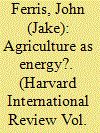

|
|
|
| 4 |
ID:
121395
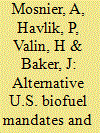

|
|
|
|
|
| Publication |
2013.
|
| Summary/Abstract |
We investigate the impacts of the U.S. renewable fuel standard (RFS2) and several alternative biofuel policy designs on global GHG emissions from land use change and agriculture over the 2010-2030 horizon. Analysis of the scenarios relies on GLOBIOM, a global, multi-sectoral economic model based on a detailed representation of land use. Our results reveal that RFS2 would substantially increase the portion of agricultural land needed for biofuel feedstock production. U.S. exports of most agricultural products would decrease as long as the biofuel target would increase leading to higher land conversion and nitrogen use globally. In fact, higher levels of the mandate mean lower net emissions within the U.S. but when the emissions from the rest of the world are considered, the US biofuel policy results in almost no change on GHG emissions for the RFS2 level and higher global GHG emissions for higher levels of the mandate or higher share of conventional corn-ethanol in the mandate. Finally, we show that if the projected crop productivity would be lower globally, the imbalance between domestic U.S. GHG savings and additional GHG emissions in the rest of the world would increase, thus deteriorating the net global impact of U.S. biofuel policies.
|
|
|
|
|
|
|
|
|
|
|
|
|
|
|
|
| 5 |
ID:
088021


|
|
|
|
|
| Publication |
2009.
|
| Summary/Abstract |
Recently a number of objections have been raised against the use of ethanol produced from agricultural products such as maize, sugarcane, wheat or sugar beets as a replacement for gasoline, despite some of their advantages such as being cleaner and to some extent renewable. We address these objections in this paper. Topics discussed include the "corn connection" (which was theorized to be a cause of deforestation in the Amazonia), the rise of food prices due to ethanol production and the real possibilities of ethanol in reducing greenhouse gas emissions. It has been shown that such concerns are grossly exaggerated and that ethanol from sugarcane, as produced in Brazil, is the preferred option for the production of fuel not only in terms of cost but also as a favourable energy balance. Finally, the possibility of expanding ethanol production to other sugar-producing countries is also discussed.
|
|
|
|
|
|
|
|
|
|
|
|
|
|
|
|
| 6 |
ID:
123594
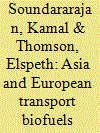

|
|
|
|
|
| Publication |
2013.
|
| Summary/Abstract |
Over the past decade, both Asia and Europe have devoted considerable effort to expanding the production of first-generation biofuels to fuel cars, taxis, buses, trucks, motorcycles, etc. On the one hand, with "peak oil" potentially looming in the future, and on the other, with an insatiable need for petroleum and diesel, the prospect of large-scale use of biofuels enjoyed tremendous public appeal as they seemed to provide a long-term alternative and clean fuel source in Asia and Europe. However, globally today, biofuels constitute only 3 % of the total transport fuel mix. Production is still steadily increasing in some countries, but their economic competitiveness and environmental sustainability have come into question in others with the result that production has slowed down considerably or even halted. The outlook for second- and third-generation biofuels is promising. However, they also cannot yet supplement, far less substitute, for petroleum and diesel in a commercially viable way.
|
|
|
|
|
|
|
|
|
|
|
|
|
|
|
|
| 7 |
ID:
123591


|
|
|
|
|
| Publication |
2013.
|
| Summary/Abstract |
We bring together a collection of papers that were presented at the inaugural event of the Asia-Europe Energy Policy Research Network (AEEPRN), held at Singapore in May 2012. The idea for creating AEEPRN was in response to the growing importance of energy in Asia and Europe's relations and to our shared belief that energy will become a more significant aspect of these relations over the forthcoming years and decades. The papers presented here cover the following themes: wind energy, biofuels, natural gas and gas pipelines, exergy and manufacturing, green energy co-operation, coal, unconventional gas and solar energy.
|
|
|
|
|
|
|
|
|
|
|
|
|
|
|
|
| 8 |
ID:
121371


|
|
|
|
|
| Publication |
2013.
|
| Summary/Abstract |
Biofuels policies and projects may lead to environmental, economic and social impacts. A number of studies point out the need to deliver comprehensive sustainability assessments regarding biofuels, with some presenting analytical frameworks that claim to be exhaustive. However, what is often found in the literature is an overexploitation of environmental and economic concerns, by contrast to a limited appraisal of the social aspects of biofuels. Building on a systematic review of the peer-reviewed literature, this paper discusses the social constraints and strengths of ethanol, with regard to the product's lifecycle stages and the actors involved. Its objective is to contribute to the development of social frameworks to be used in assessing the impact of ethanol. Main findings indicate that ethanol developments can increase the levels of social vulnerability, although there is little evidence in the literature regarding the positive and negative social impacts of 1st-generation ethanol and potential impacts of cellulosic ethanol. Further work is needed on the formulation of social criteria and indicators for a comprehensive sustainability assessment of this biofuel. Policy makers need to internalise the social dimension of ethanol in decision-making to prevent public opposition and irreversible social costs in the future.
|
|
|
|
|
|
|
|
|
|
|
|
|
|
|
|
| 9 |
ID:
098597
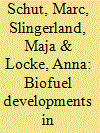

|
|
|
|
|
| Publication |
2010.
|
| Summary/Abstract |
Climate change, rising oil prices and concerns about future energy supplies have contributed to a growing interest in using biomass for energy purposes. Several studies have highlighted the biophysical potential of biofuel production on the African continent, and analysts see Mozambique as one of the most promising African countries. Favorable growing conditions and the availability of land, water and labor are mentioned as major drivers behind this potential. Moreover, the potential of biofuel production to generate socio-economic benefits is reflected in the government's policy objectives for the development of the sector, such as reducing fuel import dependency and creating rural employment. This article provides an overview of biofuel developments in Mozambique and explores to what extent reality matches the suggested potential in the country.
We conclude that biofuel developments mainly take place in areas near good infrastructure, processing and storage facilities, where there is (skilled) labor available, and access to services and goods. Moreover, our analysis shows the need to timely harmonize current trends in biofuel developments with the government's policy objectives as the majority of existing and planned projects are not focusing on remote rural areas, and - in absence of domestic markets - principally target external markets.
|
|
|
|
|
|
|
|
|
|
|
|
|
|
|
|
| 10 |
ID:
097209
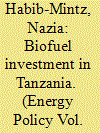

|
|
|
|
|
| Publication |
2010.
|
| Summary/Abstract |
Increasing demand for biofuels as a component of climate change mitigation, energy security, and a fossil fuel alternative attracts investors to developing countries like Tanzania. Ample unused land is critical for first generation biofuels production and an important feature to attract foreign direct investments that can contribute towards agricultural modernization and poverty reduction initiatives. Despite the economic justifications, the existing institutional and infrastructural capacities dictate the impacts of biofuels market penetrations. Furthermore, exogenous factors like global recessionary pressure depressed oil prices below the level at which biofuel production were profitable in 2007, making Tanzania's competitiveness and potential benefits questionable.
This paper investigates the extent that first generation, jatropha-based biofuels industry development in Tanzania observed during fieldwork in Kisarawe and Bahi may fulfill policy objectives. This paper argues that without strong regulatory frameworks for land, investment management, and rural development, biofuel industrialization could further exacerbate poverty and food insecurity in Tanzania. The paper concludes with policy recommendations for first generation biofuel development while keeping in mind implications of second generation production. Since the topic is broad and multifaceted, a multidisciplinary approach is used that includes political, institutional, and agricultural economics to analyze and conceptualize biofuel industry development and food security.
|
|
|
|
|
|
|
|
|
|
|
|
|
|
|
|
| 11 |
ID:
071959
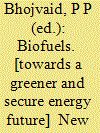

|
|
|
|
|
| Publication |
New Delhi, TERI, 2006.
|
| Description |
x, 281p.
|
| Standard Number |
8179930858
|
|
|
|
|
|
|
|
|
|
|
|
Copies: C:1/I:0,R:0,Q:0
Circulation
| Accession# | Call# | Current Location | Status | Policy | Location |
| 051331 | 662.88/BHO 051331 | Main | On Shelf | General | |
|
|
|
|
| 12 |
ID:
112266
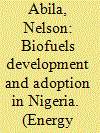

|
|
|
|
|
| Publication |
2012.
|
| Summary/Abstract |
Biofuels development and adoption in Nigeria has progressed significantly since the inception of the country's biofuel program in 2007. The rapid growth of the biofuels subsector in Nigeria inspired this review which aims at identifying the key drivers, agents, enablers, incentives and objectives driving the development. From the upstream to the downstream sub-sectors, there is an increasing entry of players and participants (private and public investors). This paper aims to explore the underlining drivers, enablers and incentives promoting the investments and participations in biofuels development, adoption and utilization in Nigeria. The research sourced data from basically secondary sources and undertook desk review of available information. The drivers identified are classified into the endogenous and exogenous categories. From the review, the paper presents a multi-components conceptual framework that captures key elements of the biofuel development in Nigeria.
|
|
|
|
|
|
|
|
|
|
|
|
|
|
|
|
| 13 |
ID:
116914


|
|
|
|
|
| Publication |
2012.
|
| Summary/Abstract |
China promulgated the Medium and Long-Term Development Plan for Renewable Energy in 2007, which included sub-targets of 2010 and 2020 for various renewable energy technologies. Almost all the 2010 sub-targets have been met and even surpassed except non-grain fuel ethanol. There is debate surrounding the questions of whether and how the country will be able to meet the 2020 biofuels target. This paper provides the assessment of potential technology pathways to achieve the 2020 target regarding their respective resource potential and supply cost. Barriers and policy options are identified based on broad literatures review. And an overview of biofuels projections is presented to provide insight into the comparison of various policy scenarios. The study shows that China can potentially satisfy non-grain fuel ethanol target by 2020 from technology perspective. But she will probably fall far short of this target if current situations continue. Additional policy efforts are needed. Meanwhile, the target of biodiesel production has high probability to be achieved. However, if given support policies, it will develop better.
|
|
|
|
|
|
|
|
|
|
|
|
|
|
|
|
| 14 |
ID:
092842


|
|
|
|
|
| Publication |
2009.
|
| Summary/Abstract |
This paper analyses national, regional and international biofuels policies and strategies to assess whether these policies promote or undermine the development of biofuels sector in Africa. Despite having a huge comparative advantage in land, labour and good climatic conditions favourable for the growing of energy crops, few countries in Sub-Saharan Africa have included biofuels strategies in their energy or national development policies. Further results show that while developed countries commit huge financial resources for research, technology development and the provision of tax-incentives to both producers and consumers, there is little government support for promoting biofuels in Africa. Although the consequences of biofuels on food supply remain uncertain, the mandatory blending of biofuels with fossil fuels by industrialized countries will create demand for land in Africa for the growing of energy crops for biofuels. This paper urgently calls upon national governments in Sub-Saharan Africa to develop appropriate strategies and regulatory frameworks to harness the potential economic opportunities from biofuels sector development, while protecting the environment and rural communities from the adverse effects of land alienation from the mainstream agriculture towards the growing of energy crops for biofuels at the expense of traditional food crops.
|
|
|
|
|
|
|
|
|
|
|
|
|
|
|
|
| 15 |
ID:
166352
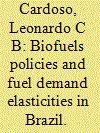

|
|
|
|
|
| Summary/Abstract |
Biofuels are often seen by policymakers as solutions to concerns about the environment, energy diversification, and rural development. To understand the impacts of biofuel policy, however, it is important to understand demand elasticities. Brazil, a leader in biofuels, provides a unique setting to increase our knowledge about biofuel policy and the interactions within and between the gasoline and ethanol markets. We estimate own-price, cross-price, and income elasticities of the demand for ethanol and gasoline using a novel instrumental variable approach to control for the inherent endogeneity between supply and demand. This results in own-price elasticities for both fuels higher than previous literature suggests: approximately − 0.9 for gasoline and − 1.5 for ethanol. Income elasticities for both fuels are approximately 0.8. We also examine the elasticity impacts following the introduction of flex-fuel cars into the Brazilian market. By estimating the model with over 100 subsamples across time, we find that cross-price elasticities become positive, significant, and increasing, but only after larger market penetration of flex-fuel cars, which occurred approximately three years after their introduction.
|
|
|
|
|
|
|
|
|
|
|
|
|
|
|
|
| 16 |
ID:
183589
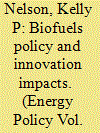

|
|
|
|
|
| Summary/Abstract |
In the early 2000s, governments implemented policies stimulating the use of ethanol and biodiesel to reduce carbon emissions and encourage domestic energy production. Blend mandates requiring gasoline or diesel to contain a minimum percentage of these biofuels were a favored policy instrument. Theoretical work by Clancy and Moschini (2017) concluded that, if innovation were stimulated by mandates, then the socially optimal mandate would be higher than if innovation were not possible. We test the impact of blend mandates and other biofuels policies on innovation using measures of patenting activity that correspond with research effort and research output. Our analysis shows that ethanol blend mandates significantly increased both R&D effort and quality-weighted innovation output in biofuels technologies while reducing the R&D inputs to plant technologies. This suggests that biofuels innovation increased in response to the policies, with firms substituting some R&D effort away from plant technologies research. Despite decreased R&D effort, output of plant innovation held steady as effort shifted to biofuels, supporting the presence of a spillover effect between biofuels innovation and plant innovation. We find that biodiesel blend mandates did not significantly impact R&D efforts in either plant or biofuels technologies. Furthermore, policies other than blend mandates had varying effects, ranging from limited increases in R&D activity to significant decreases in innovation.
|
|
|
|
|
|
|
|
|
|
|
|
|
|
|
|
| 17 |
ID:
105819
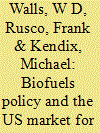

|
|
|
|
|
| Publication |
2011.
|
| Summary/Abstract |
Low ethanol prices relative to the price of gasoline blendstock, and tax credits, have resulted in discretionary blending at wholesale terminals of ethanol into fuel supplies above required levels-a practice known as ethanol splashing in industry parlance. No one knows precisely where or in what volume ethanol is being blended with gasoline and this has important implications for motor fuels markets: Because refiners cannot perfectly predict where ethanol will be blended with finished gasoline by wholesalers, they cannot know when to produce and where to ship a blendstock that when mixed with ethanol at 10% would create the most economically efficient finished motor gasoline that meets engine standards and has comparable evaporative emissions as conventional gasoline without ethanol blending. In contrast to previous empirical analyses of biofuels that have relied on highly aggregated data, our analysis is disaggregated to the level of individual wholesale fuel terminals or racks (of which there are about 350 in the US). We incorporate the price of ethanol as well as the blendstock price to model the wholesaler's decision of whether or not to blend additional ethanol into gasoline at any particular wholesale city-terminal. The empirical analysis illustrates how ethanol and gasoline prices affect ethanol usage, controlling for fuel specifications, blend attributes, and city-terminal-specific effects that, among other things, control for differential costs of delivering ethanol from bio-refinery to wholesale rack.
|
|
|
|
|
|
|
|
|
|
|
|
|
|
|
|
| 18 |
ID:
098091
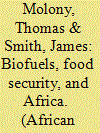

|
|
|
| 19 |
ID:
082336
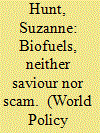

|
|
|
| 20 |
ID:
128045
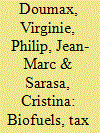

|
|
|
|
|
| Publication |
2014.
|
| Summary/Abstract |
The 2009 Renewable Energies Directive (RED) has set up ambitious targets concerning biofuel consumption in the European Union by 2020. Nevertheless, budgetary constraints and growing concerns about the environmental integrity of first-generation biofuels have imposed a phasing out of the fiscal instruments to promote them. Focusing on France, this paper combines an exogenous increase in oil prices and tax policies on fossil fuels. The objective is to determine the efficiency of an alternative incentive scheme for biodiesel consumption based on a higher price of the fossil fuel substitute. Policy simulations are implemented through a dynamic computable general equilibrium (CGE) model calibrated on 2009 French data. The results show that the 10% biodiesel mandate set by the RED would not be achieved even if the fixed taxes on diesel reach the same level as those on gasoline. Although integrating the rise in oil prices into the fiscal framework improves the biodiesel penetration rate, it remains below the target. Moreover, we find that the effects of biofuel consumption are limited to the biofuel chain sectors. In other agricultural sectors, the substitution effect of biodiesel with diesel is partially offset by the pricing effect induced by higher energy production costs.
|
|
|
|
|
|
|
|
|
|
|
|
|
|
|
|
|
|
|
|
|